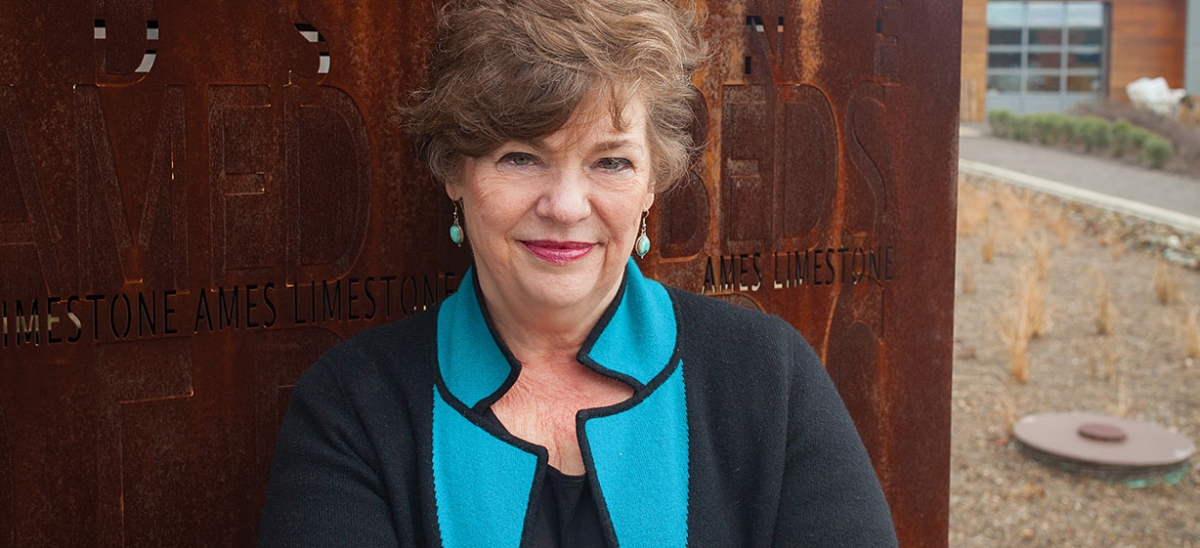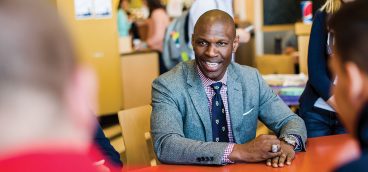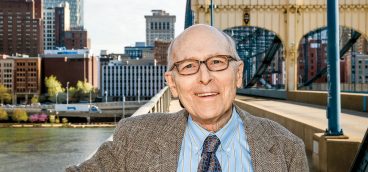Esther L. Barazzone, Educator & Administrator

I grew up in Bluefield, W.Va., a town of about 16,000, which had no “wrong side” of the tracks—because it was all tracks, for trains moving coal out of southern West Virginia. I lived there with my mother, stepfather and three brothers. Three out of four of my grandparents were immigrants—from Italy, Belgium and Ireland—and, unfortunately, I did not get to know them. In essence, I grew up lower middle-class (my stepfather was a tile setter) but, like so many children, I had no idea we had constraints. We had enough to eat and a bit extra to do some of the things we wanted to do. We were a lively bunch and, luckily, had encouraging people around us, at home and in school.
My family believed in education and much of my story springs from that. My mother had confidence that all her children would do well if we worked hard. Without a doubt, my mom was the most important influence in my life. She had earned a teaching credential which was rare for a woman who grew up on a small farm in southern West Virginia in those days. But as a woman of her era, my mother believed she could only make it in the world by being married. So she married and raised a family.
When I was 14, my mom moved us to Port Charlotte, Fla., so I had to finish my last three years of high school there. It was a pretty alien place. I found it soulless and rootless compared to Bluefield. The town was little more than a development that grew up on scrubgrass. The water was beautiful, of course. But from the time I moved to Florida, I couldn’t wait to leave.
I got what I thought was an acceptable high school education and graduated as class valedictorian. I was chosen for Girl’s State. I also made it to Girl’s Nation. (Two girls from each state in the U.S. were chosen to go to Washington, D.C., to learn about government.) Coincidentally, it was the same year that Bill Clinton went to Boy’s Nation, which he credited for fueling his belief that he could, one day, be president. In retrospect, that experience was both interesting and telling. The boys were told that, if they worked hard and had the mettle, they could become president, but we girls were assured that, maybe, we could become first lady. Nevertheless, I had opportunities. But as it turned out, my high school hadn’t maintained suitable standards and, as a result, never earned accreditation. So even though I was valedictorian and had good test scores, at best, I was headed for community college. Sure, I had aspirations but, unfortunately, I was holding a diploma from a non-accredited high school, and had no money whatsoever. I was not able to see a future at all, but I sure wanted one.
In 1964, anticipating the demands of the baby boom, new educational institutions began popping up here and there, and a place called New College, in Sarasota, Fla., was one of them. Its growth strategy, which was brilliant, was to recruit small-town high school valedictorians like me, figuring that we didn’t have a clue as to where we might go to college. Based on my grades, test scores and extracurriculars, I probably could have applied to a number of schools. But by chance, I ran across a front-page article in a local newspaper about New College—an ungraded, highly tutorial institution based on the New College, Oxford model. I carried that article into our guidance office and declared, “I want to go to there.” Before long, I was admitted as the school’s very first student, with a full scholarship. This transformed my life.
New College was premised on individual motivation and oneon- one work with faculty. It didn’t hold to what most of us understood as academic orthodoxy, but the faculty was fired up about what it was doing. Thinking back, it was the toughest place I ever loved. I was one of its least-prepared students because of where I went to high school, but I had a good enough foundation and was excited about what I was being offered, which was a chance to grow as an individual.
During my three years there, the faculty and staff at New College believed in and guided me. And as I neared graduation, my advisors called me in and said, “You came here a pretty green Southern kid, Esther Lynn (which was my name, growing up). Today, you’re better, but you’re still pretty green. We think you should spend a year abroad. Why not apply for a Fulbright Scholarship?” So I did, and got a Fulbright to Spain!
My mother was quite pleased with my academic pursuits, but didn’t always know how to encounter my world because I was occupying one that was very different from the world she had known. She actually phoned me once and told me to turn on the television because the Rev. Billy Graham was taking on “that Nietzsche fellow” I had been talking—incessantly—about. When I went to graduate school at Columbia in New York in the fall of 1968, I soon discovered the feminist movement and came to realize that some of the precepts on which I’d been raised didn’t quite fit the feminist model. For example, unlike my mother, I learned early on that I didn’t have to be married to make it in the world, though I did marry (and will soon marry again) and have two wonderful sons who have been at the center of my life, always.
In any case, my New College experience, with its academic unorthodoxy and focus on the individual, really shaped my philosophy about how education ought to be. To me, a quality educational experience is a careful balance of freedom and direction, the latter under the guidance of learned people who know the standards that students must meet to compete in the world, all the while helping them to cut their own paths. This philosophy has served me well. It helped me to determine how I would approach my professional life; as an educator first, and then in various capacities of administration—all the way up to and including my years as president of Chatham University.
In 2014, after more than a century as a premier women’s college, we at Chatham made the decision to convert the university into a co-educational undergraduate institution. (It had been coeducational in its graduate programs since 1994, when they began). My belief that educators must afford students space to explore and discover while helping them to understand and meet the demands of a changing world was a defining factor. Based in part on my own experience, admittedly, but also that of many coeducational liberal arts colleges, I believed that if the individual is given sufficient latitude and support, along with high expectations, many of the goals of education could be met, especially the empowerment of the individual.
The decision to go co-ed at Chatham was not made lightly or blindly. In truth, the university almost went co-ed in 1990, and I came here in ’92 with the charge of trying to keep it single-sex. We managed to do that for 22 more years by exploring more options for innovative academic programs (a new emphasis on international opportunities for students), for auxiliary income (graduate and online programs), and improved recruitment. But by 2013, we had tried all these things and, even though we had a healthy number of graduate students (about 1,200) then, undergraduate enrollment continued to decline. It became very clear to us that we had to do something or we were going to lose the undergraduate college.
Around that time, Standard & Poor’s noted that many smaller colleges were projected to close in coming years, and women’s colleges were particularly vulnerable. So we studied the pertinent data and what other institutions had done, and then presented our findings to the Chatham board. None of us wanted particularly to go co-ed, but we knew it had to be done. We also decided that we weren’t just simply going to admit men. Rather, we would review all our academic offerings to see if we could preserve some educational features of the Chatham experience that were clearly defining for women. We would also experiment with other innovations that are both important and attractive, and not exclusively related to gender. So in the fall of 2015, we created the Women’s Institute to continue our leadership around issues of gender, but also enrolled our first co-educational class at Chatham University—a class that was 2.5 times larger than the previous incoming class, and the largest in our history. We are all very proud of that.
“While I’ve been here, Chatham has been embracing the concept of tranformational change, and the trustees at the university have been courageous.”
—Esther Barazzone
Another feature of the Chatham educational experience that I’m proud to say was conceived and launched during my time as president is a major program focused on the environment and sustainability. Now, the Rachel Carson Institute at Chatham was created before I came but, we asked, “What is it doing?” Of course, for a long time, we had refused to use toxic chemicals on our grounds, in keeping with the warnings Rachel made in her landmark book, “Silent Spring.” But this measure really began to feel like not enough.
In all honesty, Chatham had faded from public attention somewhat during the 1970s and ’80s. After considering many remedies for this problem, we thought perhaps if we did something really significant around Rachel Carson, our most famous graduate, we might be able to reposition the university, nationally and internationally, and bring Chatham back to prominence.
While I’ve been here, Chatham has been embracing the concept of transformational change, and the trustees at the university have been courageous. Together, we came to agree that the best way to enhance our reputation and visibility was to do something “big,” believing that we could garner support for a “big idea.” In our case, we felt that something incremental for Chatham would not be enough to pull off something transformational. And then came the Eden Hall opportunity, and things began to fall into place.
Eden Hall was the vision of a man named Sebastian Mueller, who immigrated to Pittsburgh from his native Germany in 1884 to work in the fledgling food-processing operation of his cousin, Henry J. Heinz. In his five decades at “The House of Heinz,” Mr. Mueller headed the company’s manufacturing operations, served on its board of directors, and ran the organization during H.J.’s absences. Mr. Mueller won the respect and gratitude of not only the company’s founder, but also its working women. Having no heirs—his son Leland Sanford and daughters, Elsa and Alma, died in childhood—Mr. Mueller willed Eden Hall Farm to serve as a vacation and respite destination for the working and retired women of the H.J. Heinz Company, as well as for the working women of western Pennsylvania.
The scope of Sebastian Mueller’s will was broadened in 1983 when the Eden Hall Foundation was established as an additional but separate organization to further Mr. Mueller’s charitable interests. In time, the Eden Hall Foundation became the owner of the 400 acres of land that had long been known as Eden Hall Farm, which could not, financially, be continued as a separate operating foundation. So what to do with it? There was a congruity of mission between Chatham and Eden Hall Farm, as well as the Eden Hall Foundation—all were dedicated to the welfare and advancement of women. When we spoke with the Foundation about the possiblity of its considering us for the property, they asked, “What would you do if we gave it to you?”
We spent a little more than a year, I believe, developing a vision to answer this question. Our idea had to be significant for them and for us to take it on. We knew we couldn’t afford to simply keep it as a land preserve. So my senior team and I traveled all over the East Coast looking at schools with an environmental or sustainability focus trying to see what could be done to integrate Rachel Carson’s vision with the Eden Hall opportunity. After the foundation spoke with, I’m sure, a number of suitors, they found a synergy with our vision. That they chose to invest in us is a real statement about this foundation’s ability to believe in a vision that might enhance the public good. They could have sold those 400 acres in a “hot” real estate development area and increased the foundation’s assets. We cannot express our gratitude sufficiently.
This gift from the Eden Hall Foundation in 2008 has been transformative for Chatham because it provided the opportunity to create a visible symbol of our purpose. For years, we had embraced environmentalism and sustainability. In the early ’90s, we created an environmental studies program and then transformed our campus into an arboretum, so our commitment was not just empty rhetoric. However, with the opportunity of Eden Hall, we set our sights even higher, to be a leading institution in the United States in sustainabilty— to create the world’s first sustainable campus, built from “under the ground” up, and to create an academic program that would use the campus and was at the forefront in preparing professionals in the field. The Eden Hall gift combined with the wonderful philanthropy of the Falk Foundation, which helped endow the Falk School of Sustainability. And the plan is working.
At Eden Hall, we’re already “energy positive,” and have created an integrated heating and cooling system via the property’s 40 geothermal wells. In fact, the heating and cooling system for the first residence hall built at Eden Hall is the largest such system in operation in North America. We began building only three years ago and today there are five new or renovated buildings and an amphitheater that hosted over 2,000 people last summer at cultural events. Eden Hall now has core functionality as a campus, though it needs to grow more.
As a child of West Virginia, I was raised with a connection to nature and we lived pretty close to the land. My grandparents lived nearby and kept bees. They had no indoor plumbing, but they had a root cellar. In some ways, I think the things I learned there have made me understand the Chatham project at Eden Hall also as an opportunity to re-skill all of our students, many of whom have never had the chance to do the kinds of things I did as a young person, where our family would gather on a fall afternoon and take a huge iron kettle and make apple butter that would last through the winter. There was a texture to that life, and it was a good one. We now require all our undergraduates to spend some time at Eden Hall, regardless of major, in part to experience this kind of reality and the “feel” of being closer to nature. And it is our plan to share it widely with the community, especially children.
I will retire as president of Chatham University effective June 2016. I actually stayed a bit longer than I planned because I felt I had to deal with co-education. Once I reached the point of believing it had to happen, it wouldn’t have been fair to leave it to my successor. I also wanted to see the core construction at Eden Hall take place, and it has. I am happy to say that the future looks bright for Chatham in no small part due to Eden Hall, and we believe Rachel Carson would be very proud of her alma mater.
So it’s the right time for me to leave. What will I do next? I may pursue international work. After all, one of my sons is a golf pro living in China; the other is an entrepreneur in Brazil. They grew up with me in this job and inherited my “international gene,” I guess. But who knows? The world is a big place and there’s lots to do.





